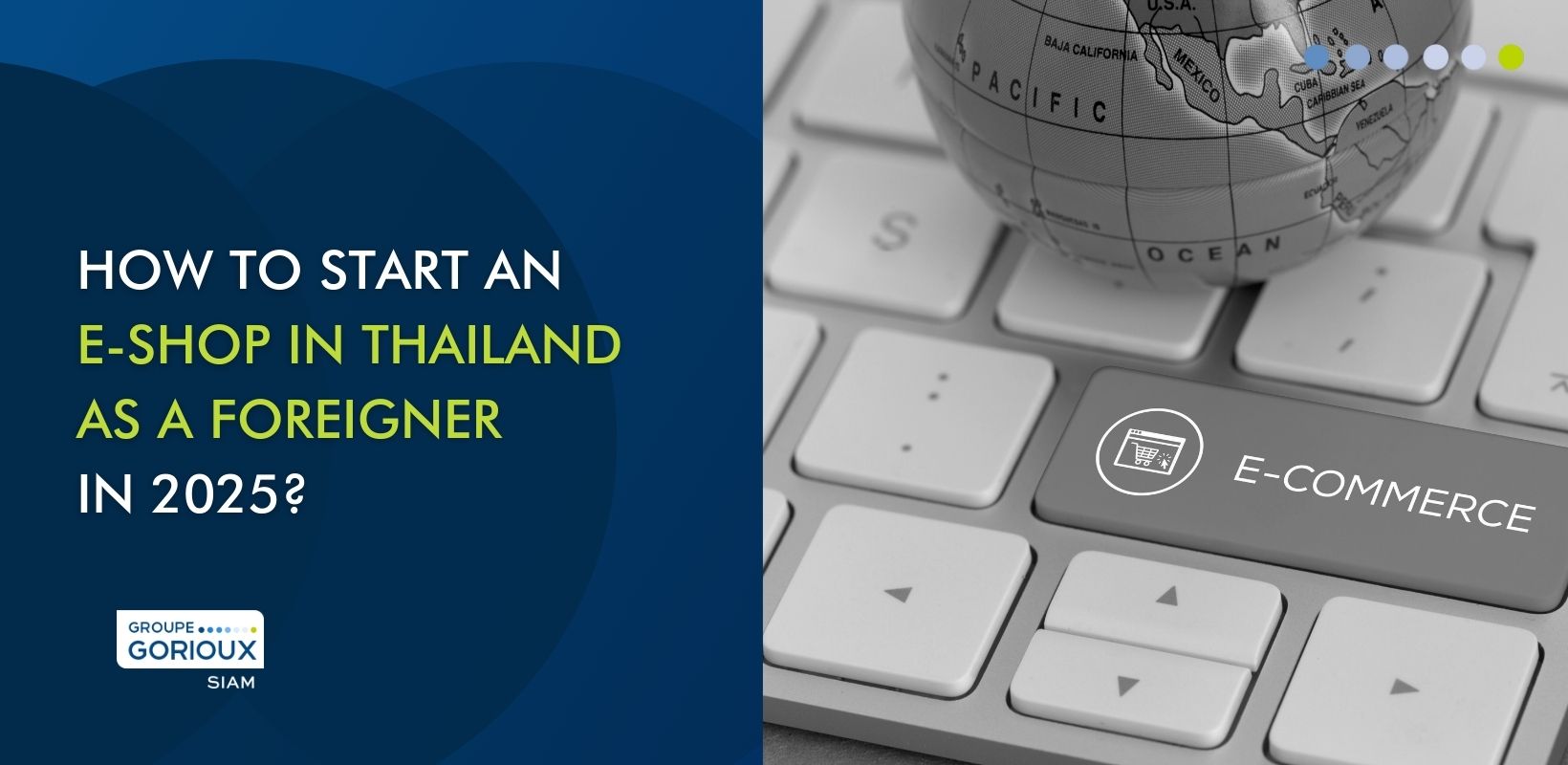Thailand is becoming a major e-commerce hub in Southeast Asia, attracting foreign entrepreneurs thanks to its growing digital economy. With a connected and tech-savvy population, the country has seen steady growth in online sales supported by increased internet and mobile penetration. Thailand’s strategic location and solid logistics infrastructure also make it a prime destination for e-commerce ventures.

.
Thailand holds a notable position within the Asian e-commerce market. With more than 61 million internet users and an estimated annual e-commerce growth of 10%, foreigners increasingly look to Thailand as a platform for launching their e-shops. Beyond digital readiness, operational costs remain competitive compared to other regional markets making Thailand a cost-effective and strategic option.
Can Foreigners Legally Open an E-Shop?
Foreigners must understand key ownership regulations before launching an online business. According to the Foreign Business Act (FBA), foreigners cannot hold more than 49% of shares in certain types of businesses unless specific licenses are granted.
There are several paths available to foreign entrepreneurs: they may set up a Thai company with a local majority shareholder or apply for a Foreign Business License (FBL), which allows 100% foreign ownership subject to capital and operational requirements. An alternative option is registration under the Board of Investment (BOI): for tech and digital projects, such as software development or e-commerce platforms.
Market Access Alternatives
To facilitate entry, foreign entrepreneurs may consider partnering with local franchises or distributors. E-commerce franchises provide easier legal pathways and tested operational structures.
Popular platforms such as Lazada, Shopee, JD Central, Amazon SEA and Tik Tok Shop enable sellers to reach wide audiences without creating standalone online stores. These marketplaces also help reduce legal and logistics hurdles. Another option is dropshipping, which offers low initial investment, although it requires attention to Thai customs and VAT regulations.
Company Registration and Legal Compliance
To legally establish an e-commerce business, foreign investors must register with the Department of Business Development (DBD), open a Thai corporate bank account and obtain a VAT ID if revenue exceeds the legal threshold. They must also draft service contracts with local providers.
Depending on the product category (food, cosmetics, health, etc.), businesses may require specific licenses. In addition, website terms and conditions, return policies, and data protection practices must comply with Thai law. The Personal Data Protection Act (PDPA) and E-Transactions Act apply. For full compliance, it’s strongly advised to consult a local legal expert such as Gorioux Siam. Foreign entrepreneurs planning to live in Thailand should also secure a visa and work permit aligned with their business role.

Tax and Accounting
Companies with annual revenue exceeding 1.8 million THB are subject to 7% Value Added Tax (VAT). The standard corporate income tax rate is 20%. A reduced rate of 15% applies to Small and Medium Enterprises (SMEs), which represent the majority of companies in Thailand, typically those with annual revenue below 30 million THB.
Monthly or quarterly reporting to the Thai Revenue Department is mandatory. To avoid penalties, businesses should collaborate with certified accountants. Explore accounting and audit services here.

Market Trends and Opportunities
Thai consumers are highly active on mobile and social platforms with apps like Facebook, Instagram, Lazada Live, Shopee Live and increasingly TikTok Shop playing a central role in everyday digital interactions. A standout trend is the rapid growth of live shopping, a format that has become extremely popular in Thailand. Through real-time product demonstrations and direct engagement with viewers, brands especially in the fashion, beauty, food and handmade goods sectors can drive instant purchases and build stronger connections with local audiences.
TikTok Shop, in particular, has emerged as a key platform in the region combining viral content, influencer marketing and integrated e-commerce to create a seamless and highly engaging shopping experience. Its popularity among Asian consumers, including Thais, continues to grow rapidly.
According to DataReportal (2024), over 57% of Thai internet users reported watching a shopping livestream at least once a month, underscoring the format’s wide reach and impact.E-commerce demand remains strong especially in categories like beauty, wellness, specialty foods and imported products. Tourist-heavy regions such as Bangkok, Chiang Mai, and Phuket also present high online sales potential due to their large and diverse consumer base.

.
Thailand remains a promising yet regulated e-commerce destination. With the right knowledge and professional guidance, launching a successful online store is well within reach.
For tailored support on legal structures, compliance or accounting in Thailand, reach out to Gorioux Siam our experts are here to help you succeed.




